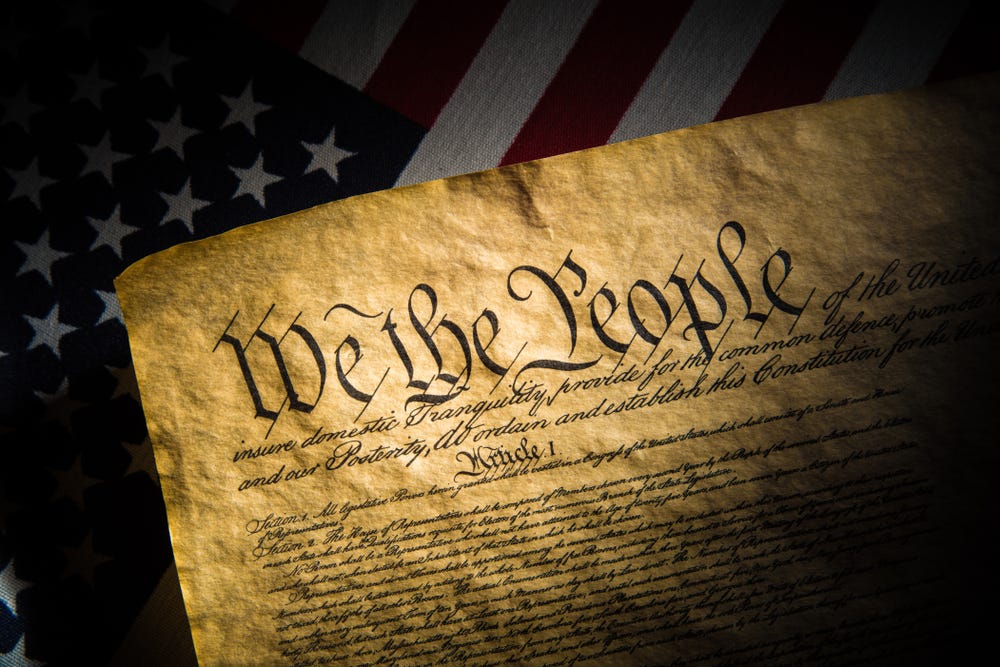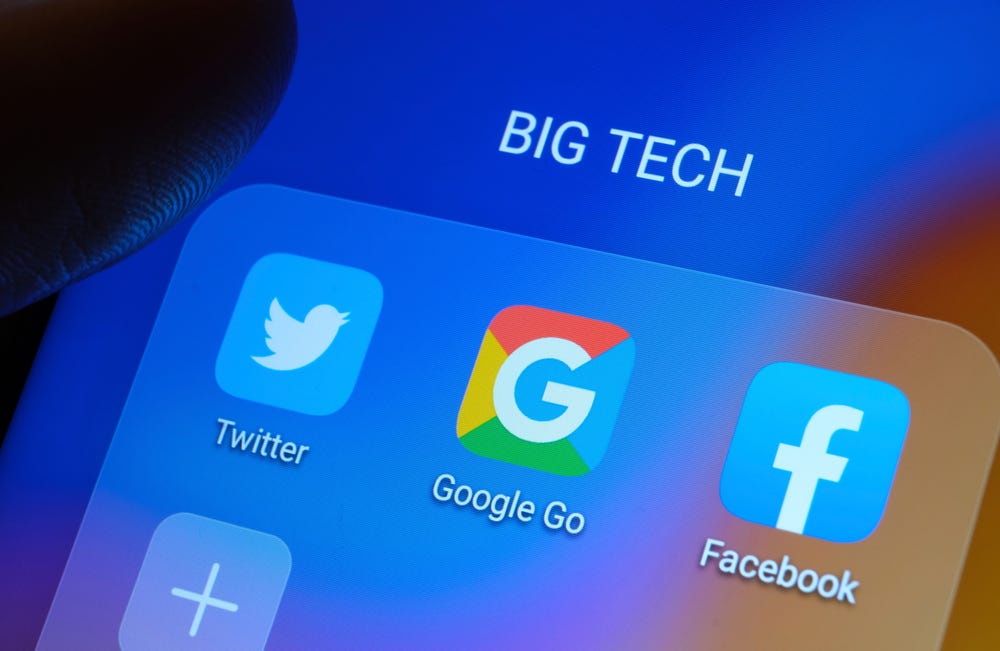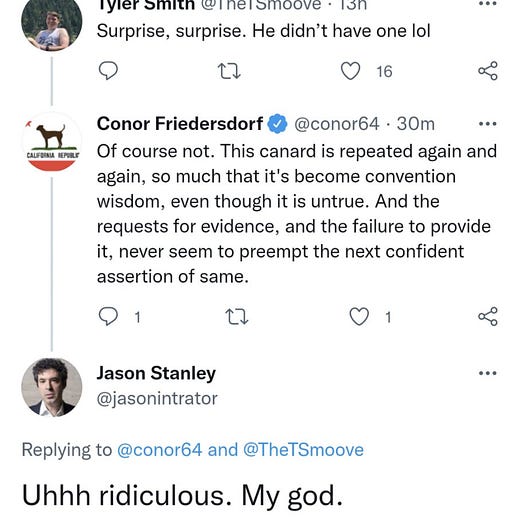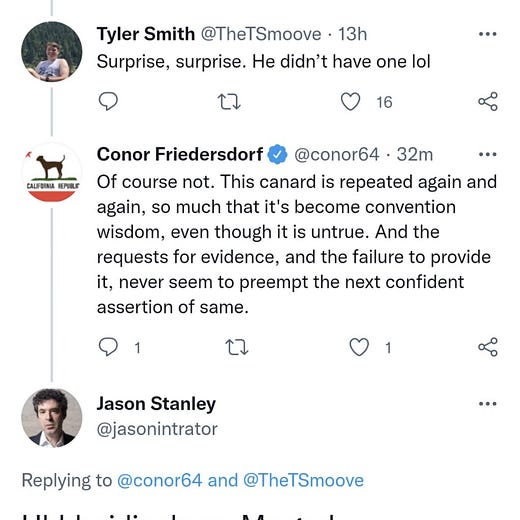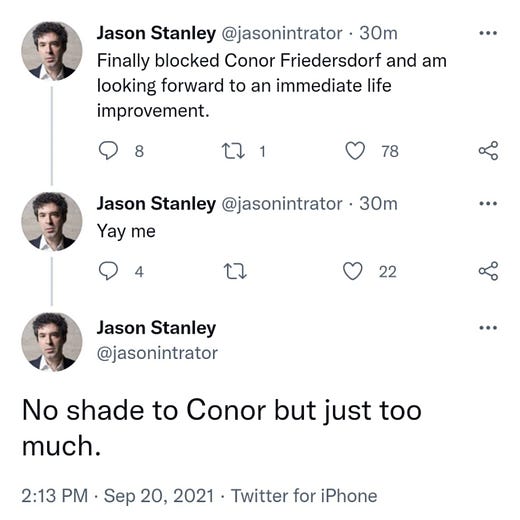E-Pluribus | September 20, 2021
The rival Constitution, our new media oligarchs, and what books are really being banned.
A round up of the latest and best writing and musings on the rise of illiberalism in the public discourse:
Craig Trainor: George Floyd and the Rise of the Rival Constitution
In an essay at Quillette reflecting on post-George Floyd America, Craig Trainor explores the idea of a “rival Constitution” that Christopher Caldwell wrote about in his 2020 book, The Age of Entitlement. The pen and paper Constitution that set limits on government and guarantees liberty is subject to increasing competition from more ephemeral notions of equity and diversity as expressed in social justice campaigns, regulations, bureaucracies, court rulings, and even civil rights statutes. Trainor asserts that this competition will ultimately lead to a constitutional crisis, the outcome of which is uncertain in spite of Trainor’s clear desire that pen and paper prevail.
If one wants to understand the intellectual underpinnings of the reaction to Floyd’s death, then The Age of Entitlement is essential reading. Caldwell’s overarching narrative holds that modern America is governed by two fundamentally irreconcilable constitutions. The first is the actual Constitution—the one that preserves liberty through the structural protections of the separation of powers and federalism and the rights articulated in its first 10 amendments. The second constitution—what Caldwell calls the “rival constitution”—is a complex web of civil rights statutes, judicial claims, policies and regulations, bureaucracies, and a cultural attitude of entitlement upon which this power structure has been constructed and organized. This is less an extension of the Civil Rights Act of 1964 that ended de jure segregation based on race in public accommodations, and more the hardening of an “all-embracing ideology of diversity.”
[…]
Reading The Age of Entitlement prior to May 25th, 2020, the existential dimension of Caldwell’s argument might have seemed alarmist and overwrought. Today, however, it is surely undeniable that the 2020 unrest—ignited by a single instance of police misconduct but inflamed by selective media coverage, COVID-19 lockdown boredom, BLM ideologues, the demagogic architect of the 1619 Project, and assorted left-wing activists and anarchists—was an outburst of political violence in the name of the rival constitution. For those who favor the actual Constitution (and I do), how we arrived at this moment matters, and Caldwell does an exceptional job of guiding us through the relevant markers of history.
Read it all.
George F. Will: Facebook, Google and Twitter are the new ‘oligarchy of speech’
Echoing some of the conclusions and concerns of Eugene Volokh in a UC Davis Law Review paper from earlier this year, George Will writes that in some respects, the way the new online media functions is not all that different than the old offline media. Although the number of media outlets has exploded and individuals have the ability (in theory) to reach billions, the role that a relatively small number of newspapers, magazines and networks used to play as gatekeepers is now played by even few gatekeepers: social media giants and internet platforming companies. Volokh (and Will) contend therefore that control “is more oligarchical than ever.”
While the “old expensive-speech system” may have seemed “undemocratic,” at least the media owners were disciplined by market forces (loss of their audience’s confidence could be costly), they valued their reputations, and because they had financial assets, they were disciplined by the risk of liability for, say, libel. The democratic and egalitarian Internet has, Volokh says, “the vices of those virtues.” The mainstream media had defects, but, says Volokh, they “didn’t offer much of a voice to people obsessed with private grievances, or to outright kooks, or to the overly credulous spreaders of conspiracy theories.”
Many people who spread hoaxes and “fake news” with a few clicks have no significant assets, financial or reputational, that are risked by issuing, say, defamatory falsehoods. The First Amendment generally protects reckless speech by the credulous or malicious from criminalization. And a controversial 1996 statute stipulates that Internet content and service providers do not have the legal status of publishers or speakers of material posted by others.
Hence, says Volokh, “for much online material, there is no potential institutional defendant who might be held accountable.” Thus there is no “incentive to police speech.”
[…]
Newspapers, which cost money to publish and make money from advertisers and subscribers, are accountable in multiple ways. But because Internet users can speak cheaply and without persuading “any intermediary about the worth of their speech, judges are likely to see much more speech that seems pointless and ill-motivated.” Volokh is rightly uneasy about courts enforcing such judgments. Today, however, three non-government intermediaries — Facebook, Google, Twitter — mean that control “is more oligarchical than ever.”
Read the whole thing.
Thomas Spence: ‘Banned Books Week’ Isn’t Actually Interested in Banned Books
Earlier this month, I wrote here at Pluribus about some disturbing trends in the publishing industry. At the Wall Street Journal, Thomas Spence, president of Regnery Publishing, contrasts real life examples of book banning with the focus of Banned Books Week, sponsored in part by the American Booksellers Association and American Library Association, both of whom have shown a waning resolve in standing up to censorship.
[F]or the first time in the 40-year history of Banned Books Week, writers and publishers face the threat of real book-banning. Strangely enough, the sponsors of Banned Books Week have nothing to say about it.
My own publishing house, Regnery, and our authors have been in the crosshairs of powerful forces. Last year we published “Irreversible Damage: The Transgender Craze Seducing Our Daughters” by Abigail Shrier, a lawyer who writes frequently for these pages. Focusing on the recent explosion of gender dysphoria among adolescent girls, she questions the rush to subject minors to life-altering surgical and chemical treatments.
A few months later, Amazon announced that it would no longer sell another title on a similar topic, “When Harry Became Sally: Responding to the Transgender Moment,” a 2019 book by Ryan T. Anderson.
We wondered if “Irreversible Damage” was next, and dozens of Amazon employees tried to make sure it was, petitioning to expunge it from the online store. Amazon, fortunately, decided not to ban Ms. Shrier’s book.
[…]
The worst casualties of Amazon’s banning will be unseen: the books not published because they might be excluded from the only bookstore that really matters. What publisher will invest in a book if Amazon is unlikely to carry it?
You might think that this genuine book-banning would give a new complexion to this year’s Banned Books Week. Yet one of the principal sponsors, the American Booksellers Association, is no more interested in giving dissenters a place on the shelf than Sen. Warren is.
Read it all here.
Around Twitter
The chilling of speech in Hong Kong continues:
John McWhorter’s new newsletter at The New York Times has provoked some strong reactions. Jason Stanley spars with Zaid Jilani, Cathy Young, and Conor Friedersdorf:
And finally, San Francisco mayor London Breed is the latest political leader to get caught violating COVID rules and not appearing to understand why it matters:




